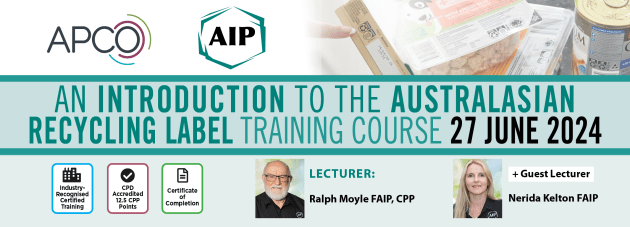The AIP will be running an updated version of the Introduction to the Australasian Recycling Label (ARL) program training course on 27 June, and all of industry is invited to attend from Australia and New Zealand.
The ARL program provides packaging technologists, designers and marketers with the tools to inform responsible packaging design.
It is an evidence-based program that can provide consumers with easy-to-understand instructions about how to correctly dispose of a product’s packaging.
The ARL program simulates the two countries' recycling ecosystems including collections systems, technical recyclability, and available end markets for materials.
The ARL logos will identify which bin or bins each component goes in, based on the regions, state or country that the product is sold.
The system then identifies whether it is recyclable, conditionally recyclable or non-recyclable, and the ARL matches the assessment.
“With the packaging industry evolving at such a rapid pace, so is the ARL program for Australia and New Zealand,” said Nerida Kelton, executive director of the AIP.
“If more brands moved to incorporating the ARL on all packaging across Australia and New Zealand, the more chance we have to increase the recovery of recyclable materials and reduce contamination in the waste stream.”
According to recent figures:
- 62% of Australians and 63% of New Zealanders look to on-pack labelling on primary packaging for their recycling truth;
- 76% of Australians and 71% of New Zealanders now recognise the ARL on packaging; and
- Over 500,000 SKUs now have the ARL on packaging across the ANZ region.
This new version of the ARL training course now includes:
- Guides on how to use ARL logos;
- Changes to soft plastics thresholds;
- The new Check Locally program;
- Interactions between ARL and Away From Home collection programs;
- ARL and container deposit schemes;
- ARL and the RecycleMate app;
- ARL and QR codes;
- ARL consumer insights;
- ARL marketplace for SMEs;
- Best practice award-winning examples; and
- Interactive sessions with attendees and their own packs.
This training course will help guide companies that have never applied the ARL to their packaging, and also update those who already use the ARL.
This course is suitable for SMEs and multinational businesses to attend.
The AIP strongly recommends that packaging technologists and specialists, designers, marketing teams, sustainability experts, packaging consultants, and design agencies all attend this course in order to better understand the true value that the ARL program offers businesses.
To book your place, click here. All AIP training courses are internationally recognised and approved to attain Certified Packaging Professional (CPP) points.







